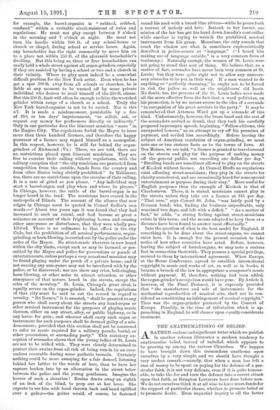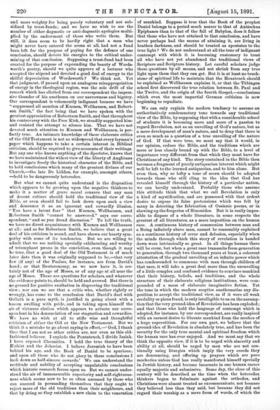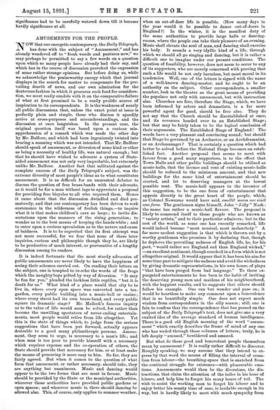THE ANATHEMATISING OF BELIEF.
ARATHER curious and significant letter which we publish in another column illustrates a modern tendency to anathematise belief, instead of unbelief, which appears to be growing up among the various Churches. We happen to have brought down this tremendous anathema upon ourselves by a very simple, and we should have thought a very modest remark,—namely, that when a man has left a sum of money to be spent on paying for the defence of a par. ticular faith, it is not very delicate, even if it is quite honour- able, to take the fee and turn the defence into a covert attack upon that faith, as Bampton Lecturers have done before now. We do not ourselves think it at all wise to leave trust-funds for the support of particular theses, whether to promote belief or to promote doubt. Even impartial inquiry is all the better and more weighty for being purely voluntary and not sub- sidised by trust-funds; and we have no wish to see the number of either dogmatic or anti-dogmatic apologies multi- plied by the endowment of those who write them. But still, it does seem to be hardly right that a man who might never have entered the arena at all, had not a fund been left for the purpose of paying for the defence of one conclusion, should devote his energies to the critical under- mining of that conclusion. Supposing a trust-fund had been created for the purpose of expounding the beauty of Words- worth's poetry, should we quite approve of a lecturer who accepted the stipend and devoted a good deal of energy to the skilful depreciation of Wordsworth ? We think not. Yet that judgment, if passed upon an analogous misappropriation of energy in the theological region, was the sole drift of the remark which has elicited from our correspondent the impres- sive thunder of his anathema on our narrowness and bigotry. Our correspondent is vehemently indignant because we have "suppressed all mention of Kuenen, Wellhausen, and Robert- son Smith," the fact being that we have spoken with the greatest appreciation of Robertson Smith, and that throughout his controversy with the Free Kirk, we steadily supported him, and resisted the attempt to silence him. That we have not devoted much attention to Kuenen and Wellhausen, is per- fectly true. An intimate knowledge of those elaborate critics of the Old Testament is not so widespread that every layman's paper which happens to take a certain interest in Biblical criticism, should be required to give accounts of their writings. But any one who knows anything of the Spectator, knows that we have maintained the widest view of the liberty of Anglicans to investigate freely the historical character of the Bible, and to hold conclusions which many of the greatest divines of our Church,—the late Dr. Liddon, for example, amongst others, —held to be dangerously heterodox.
But what we cannot quite understand is the disposition which appears to be growing upon the negative thinkers to make it a matter of grave moral censure that any man of decent culture should hold the traditional view of the Bible, or even should fail to look down upon such a view and denounce it as an ignorant and cowardly illusion. "You have a latent fear" that Kuenen, Wellhausen, and Robertson Smith "cannot be answered," says our corre- spondent, "and so you dread discussion." To tell the truth, we have no direct acquaintance with Kuenen and Wellhausen at all ; and as for Robertson Smith, we believe that a great deal of his criticism is sound, and have shown our hearty sym- pathy with some of its tendencies. But we are willing to admit that we see nothing specially exhilarating and worthy of triumphant pearls in the conviction, even though it may be true, that a good deal of the Old Testament is of much later date than it was originally supposed to be,—that very few (if any) of the Psalms, for instance, are from David's hand ; or that Deuteronomy, as we now have it, is cer- tainly not of the age of Moses, or of any age at all near the age of Moses. These are questions for scholars, and whatever the evidence points to, should be held and avowed. But there is no ground for positive exultation in disproving the traditional view ; nor can we see that a critic who, whether rightly or wrongly, has come to the conclusion that David's duel with Goliath is a pare myth, is justified in going about with a bosom swelling with pride, and in taking upon himself the air of virtuous elation which appears to actuate our corre- spondent in his denunciation of our stagnation and cowardice. We have no wish at all to stifle wise and thoughtful criticism of either the Old or the New Testament. But we think it a mistake to go about saying in effect,—' God,! thank thee that I am not as other critics are, nor even as this old- fashioned believer. I explode the Pentateuch, I divide Isaiah. I have exposed Chronicles. I hold the true theory of the Elohist and the Jettovist. I believe Jeremiah to have been behind his age, and the Book of Daniel to be spurious ; and upon all those who do not glory in these conclusions I look down as half-sincere cowards.' We can understand the rectitude and nobility of accepting unpalatable conclusions which historic research forces upon us. But we cannot under- stand the air of immeasurable superiority and self-righteous- ness which seems now to be so often assumed by those who can succeed in persuading themselves that they ought to reject more of the old traditions than their neighbours, and that by doing so they establish a new claim to the veneration
of mankind. Suppose it true that the Book of the prophet Daniel belongs to a period much nearer to that of Antiochus Epiphanes than to that of the fall of Babylon, does it follow that those who have not attained to that conclusion, and have never perhaps had the means of attaining it, are living in heathen darkness, and should be treated as apostates to the true light P We do not understand at all the tone of indignant contempt with which it is becoming customary to treat all who have not yet abandoned the traditional views of Scripture and Scripture history. Let careful scholars judge these questions by all means, and not shrink from any true light upon them that they can get. But it is at least no touch- stone of spiritual life to maintain that the Hexateuch should be explained as Wellhausen explains it, or that the Tubingen school first discovered the true relation between St. Paul and the Twelve, and the origin of the fourth Gospel,—conclusions which even the most impartial German criticism is now beginning to repudiate.
We can only explain the modern tendency to assume an authoritatively condemnatory tone towards any traditional view of the Bible, by supposing that with a considerable school of students it is becoming more and more of a passion to regard Revelation, not as an unveiling of God's nature, but as a mere development of man's nature, and to deny that there is even BO much as a question of a true unveiling of the nature of God. If that were true, we must say that it would, in our opinion, reduce the Bible, and the traditions which are more or less closely bound up with the Bible, to a level of importance very different from that which they must have for Christians of any kind. The story contained in the Bible then becomes a fragment of purely antiquarian interest which might well be left to the learned antiquarian, and to him alone. But even then, why so lofty a tone of scorn should be adopted towards those who still cling to the idea that God has revealed himself through the history of a particular nation, we can hardly understand. Probably those who assume this attitude think that what we call Revelation is only a kind of mystification, and are possessed with that ardent desire to expose its false pretensions which was felt by many in detecting the fabrication of Ossianic poems, or in showing up the forgeries of Simonides. But it is really impos- sible to dispose of a whole literature, in some respects the greatest of all literatures, as a mere imposition on the human race. A continuous history of communion between man and a Being infinitely above man, cannot be reasonably explained as a continous history of error and delusion, especially when the minds through which this story of revelation is handed down were intrinsically so great. In all things human ttere will be error, but when a great race transmits from generation to generation, through two thousand years at least, a coherent attestation of the gradual unveiling of an infinite power which has condescended to commune with man through children of that race, it will take a great deal more than the unravelling of a little complex and confused evidence to convince mankind that their history, beliefs, and traditions, and the whole structure of their elaborate religious institutions, were com- pounded of a mass of elaborate imaginative fiction. Yet the tone in which the modern sceptics anathematise any dis- position to accept the traditional view, as if it were all weak credulity or pious fraud, is only intelligible to us on the assump- tion that the very ground-idea of Revelation has been exploded; and that those who hold the language of contempt which is adopted, for instance, by our correspondent, are really inspired with an earnest desire to liberate mankind from the meshes of a huge superstition. For our own part, we believe that the ground-idea of Revelation is absolutely true, and has been the security for the only true mental and spiritual freedom which the human race has ever enjoyed. - And we must say that we think the opposite view, if it is to be urged with sincerity and ability at all, should be urged by men who are not con- tinually using liturgies which imply the very creeds they are denouncing, and offering up prayers which are pure mockeries unless God has really manifested himself specially in Jewish history, and become incarnate in one human career equally majestic and submissive. Some day, the close of this century will be described as the time when the heterodox thinkers began to fulminate against the orthodox, and Christians were almost treated as excommunicate, not because they believed leas than they said, but because they did not , regard their worship as a mere form of words, of which the
significance had to be carefully watered down till it became hardly significance at all.




































 Previous page
Previous page